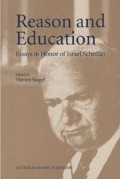Abstract
This paper argues that there is an urgent need for philosophers to convince educationalists of the practical value and the necessity of the philosophical task, particularly analysis. The nature of philosophical analysis is outlined in terms of the criteria of clarity, coherence, completeness and compatibility, which, it is argued, in turn lead to a degree of commonality. The tendency to substitute metaphor or analogy for analysis in argument is then considered, with illustrative reference to the idea of teaching as a craft. In the final section, it is suggested that resort to analogy is merely one example of a more general tendency to distance ourselves from the task of coming to grips with what is actually our field of interest, namely education.
Access this chapter
Tax calculation will be finalised at checkout
Purchases are for personal use only
Preview
Unable to display preview. Download preview PDF.
Notes
Scheffler, I.: 1960 The language of education (Springfield, Illinois: Charles C. Thomas).
Perhaps I should say “in the context of rational argument”, since that is really my point; I assume that learned journals and scholarly articles are concerned with rational argument rather than other modes of communication.
Scheffler, I.: 1979 Beyond the letter: A philosophical inquiry into ambiguity, vagueness and metaphor in language (London: Routledge and Kegan Paul).
Ibid. p. 129.
Something of what that answer is will become apparent as we proceed.
E.g. Peters, R.S.: 1966 Ethics and education (London: Allen and Unwin).
See, for example, Barrow, R., The philosophy of schooling, 1981 (Brighton, Sussex: Wheatsheaf); “Five commandments for the eighties”, in Barrow, R. (ed.) ‘Philosophy and education’, Educational Analysis Vol. 4, No. 1, 1982 (Sussex: Falmer Press); Giving teaching back to teachers, 1984 (Brighton, Sussex: Wheatsheaf); “Analysis”, “Concept”, etc. in Barrow, R. and Milburn, G., A critical dictionary of educational concepts, 1986, 2nd Ed. 1990 (Herts: Harvester Wheatsheaf); Language, intelligence and thought, 1993 (Hants: Edward Elgar), and “Philosophy of education: the analytic tradition” in Husen T. and Postlethwaite, N. (eds.), The international encyclopedia of education, 2nd Ed., 1994 (Oxford: Pergamon).
On this issue, see further Barrow, R., The philosophy of schooling, op. cit., and Graham, K.: 1977 J.L. Austin: A critique of ordinary language philosophy (Hassocks, Sussex: Harvester).
See further, Barrow, R.: 1993 Utilitarianism: a contemporary statement (Hants: Edward Elgar), and Language, intelligence, and thought, op. cit.
Ibid. See also “Analysis”, op. cit. and “Philosophy of education: the analytic tradition”, op. cit.
Ibid. See also “Does the question ‘What is education?’ make sense?” in Educational theory, 33, Nos. 3-4, 191-5 (1983) and “Misdescribing a cow: the question of conceptual correctness” in Educational Theory, 35, No. 2, 205-219, (1985) and rejoinders by Nordberg, R. and Wilson, J. in the same volume.
See, e.g. McIntyre, A., After virtue, 1981 (London: Duckworth), and my response in Utilitarianism, op. cit. For Egan, K., on this topic, see, Education and psychology: Plato, Piaget, and scientific psychology, 1983 (New York: Teachers College Press).
On metaphor, see, e.g. Black M., Models and metaphors: studies in language and philosophy, 1962 (Ithaca, New York: Cornell University Press); Brown, R.H.: 1977 A poetic for sociology (Cambridge: Cambridge University Press); Egan, K. “Metaphors in Collision: objectives, assembly lines and stories” in Curriculum inquiry, 18; Rico, G., “Metaphor and knowing: analysis, synthesis, rationale”, unpublished doctoral dissertation, Stanford University. See also, of course, Scheffler’s Beyond the letter, op. cit. and the works referred to therein.
It is perhaps worth stressing again that in my view most if not all the claims I make here would be acknowledged by Scheffler (and all the theorists whose positions he considers) and, indeed, many other more detailed similar points could be culled from their work. My point is to draw a particular conclusion that they happened not to draw, for whatever reasons.
See, e.g., Tom, A.R.: 1982 Teaching as a moral craft (New York: Longman).
Overgaard, V., “Teaching conceived as a social practice”, unpublished doctoral dissertation, Simon Fraser University.
Tom, A. R. op. cit.
Wilson, J.: 1993 Reflection and practice: teacher education and the teaching profession (London, Ontario: Althouse Press).
See Levin, B.: 1992 If you want my opinion (London: Jonathan Cape).
Theobald, M.: 1992 “Writing women teachers’ lives”, ANZHES Conference Proceedings, 1991.
See further, Barrow, R.: 1991 “Censorship and schooling” in Spiecker, B., and Straughan, R. (eds.), Freedom and indoctrination in education (London: Cassell).
See further, Barrow, R.: 1994 “Philosophy of education: the analytic tradition” in Husen, T. and Postlethwaite, N., (eds.) The international encyclopedia of education; 2nd ed., Vol. 8 (Oxford: Pergamon).
Author information
Authors and Affiliations
Editor information
Editors and Affiliations
Rights and permissions
Copyright information
© 1997 Springer Science+Business Media Dordrecht
About this chapter
Cite this chapter
Barrow, R. (1997). Language: Definition and Metaphor. In: Siegel, H. (eds) Reason and Education. Springer, Dordrecht. https://doi.org/10.1007/978-94-011-5714-8_9
Download citation
DOI: https://doi.org/10.1007/978-94-011-5714-8_9
Publisher Name: Springer, Dordrecht
Print ISBN: 978-0-7923-4362-2
Online ISBN: 978-94-011-5714-8
eBook Packages: Springer Book Archive

